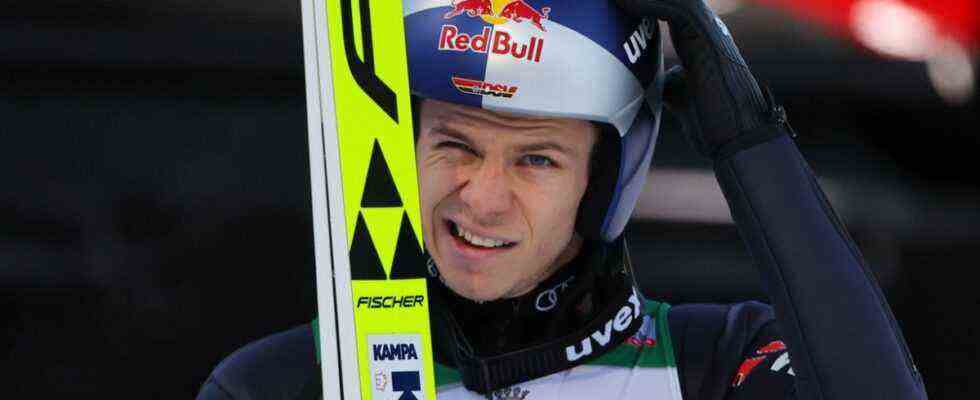It’s actually inconceivable that this ski jumper’s good mood and broad grin will one day disappear. Andreas Wellinger, who always finds a relaxed saying, who still gives answers even after short jumps and who likes to party, doesn’t give up. But now: this cloudy statement. No “So!”, no “Half so wild!”, Also no “Schaumamal how’s it going on!”, with which he otherwise aims for the next form high. Instead, a quiet voice and the murmured final sentence: “There’s nothing else to say than: shit gone.”
Wellinger is one of those ski jumpers who seldom excel in the long World Cup winter, but who are usually contenders for a medal at the peak of the season, be it the World Championships or the Olympics. Maybe also because big events are somehow like big parties. Wellinger’s last chance to qualify for Beijing in Titisee-Neustadt was eagerly awaited, but then, after many attempts this winter, the news reached him: Corona positive. “Although just above the limit,” said Wellinger, “but still positive. That’s extremely bitter.”
Olympia, it was immediately clear, was no longer possible for him. On the one hand, because there is no more training time, on the other hand, because he could not collect the last points and better German jumpers remain in front of him. The team actually looks respectable without Wellinger thanks to Constantin Schmid, 22, the experienced Pius Paschke, the reliable jumping Stephan Leyhe, and of course the medal candidate Markus Eisenbichler and the medal favorite Karl Geiger. If no one gets injured, Wellinger and the other form seeker Severin Freund will stay behind – the two jumpers who helped push the German ski jumping high in the 1900s, which has lasted to this day.
Wellinger definitely stands out from the majority of these pilots
The confident captain was a friend, and Wellinger the symbol of inner ease. As a teenager, he achieved Olympic gold with the team in Sochi in 2014. Two World Championship silver medals followed and then, in 2018, the appearance in Pyeongchang. There, in the bitterly cold ski jumping stadium, Wellinger caught that constant level of performance that is often thoughtlessly denied to young ski jumpers.
The Germans hadn’t won an Olympic medal since Jens Weißflog in 1994, until Wellinger, after a flawless first round on the normal hill, was the last jumper on top, dropped into the track, raced towards the edge – and then just kept flying, like it did just create young athletes without worries. He easily left the green line of the leader behind him, landed elegantly, and although everything was actually already clear, Wellinger crouched in the snow with a stony face and, when the “1” lit up, slowly tilted into the snow, his hands in front of his face.
Once the symbol of inner lightness in the German team: Andreas Wellinger two years ago ski flying in Oberstdorf.
(Photo: Jürgen Feichter/Eibner/imago)
The Ruhpoldinger certainly stands out from the majority of these pilots, who are mostly self-controlled people, mostly objective thinkers and capable of self-optimization and concentration. Exuberance is not the thing for most jumpers, but Wellinger happily strides to the press conference after success and lets the journalists already working on the text know with cheeky jokes that he is here now.
“The body was full of adrenaline, the tears gushed out”
In South Korea 2018, this spontaneous manner resulted in a respectable victory celebration. The next day, Wellinger reported on a champagne bottle that was beheaded on stage at midnight with biathlon winner Laura Dahlmeier. He later estimated that it was probably about five o’clock in the hotel, and he was no longer familiar with the other details of his golden night. However, what he was able to explain to the media the next day was the reason why his mobile phone gave up the ghost at times: “There were 160 text messages on it, the technicians are working on it.” To the sports information service he gave the reason why he fell forward in the snow at the moment of victory: “My head was empty, my body full of adrenaline, and then the tears gushed out.”
If you didn’t know that many great ski jumpers win precisely because they aren’t party animals, you could demand more Wellingers. But it would be enough if the original found its way back to the top. He would probably be a long way from that even without the Corona lockdown – Wellinger’s shape curve this winter resembles the jagged main ridge of the Alps. It went up and down, often directly alternating. In Klingenthal in December he finished sixth, before and after 37th and 21st. There were several signs of an upswing, but this was not confirmed.
And yet he had seen worse times, and his image of a rascal was no longer correct for a long time. In June 2019, Wellinger suffered a serious knee injury in training, the rupture of the anterior cruciate ligament was only part of the damage. When he wanted to start again in the summer, he fell on his shoulder and broke his collarbone. Again he missed almost a whole season.
Compared to then, his situation is probably not so hopeless today. His body is fit, Wellinger might soon be able to hold on to the jumping form that he has already shown again. But he will only experience the Olympics on television.

